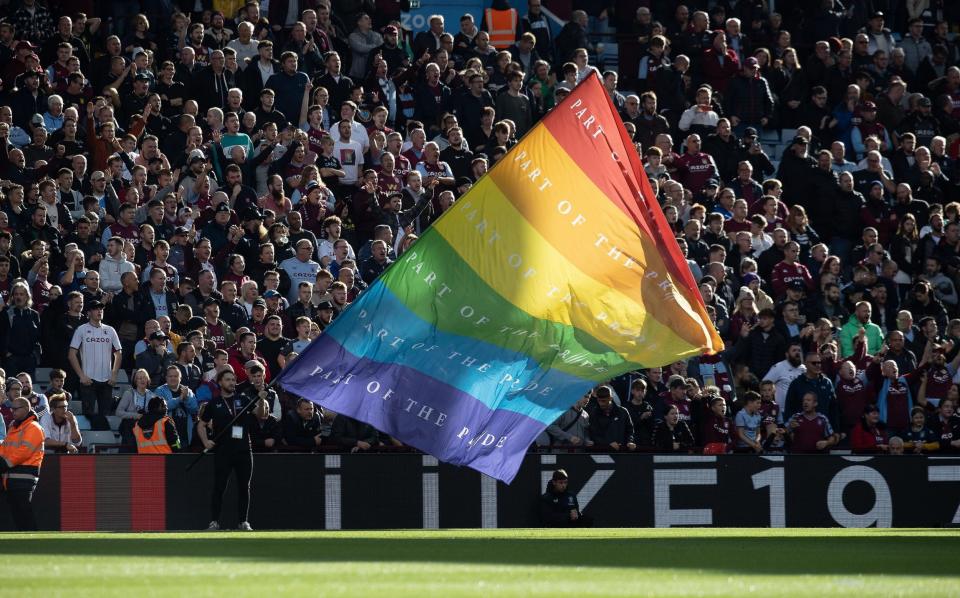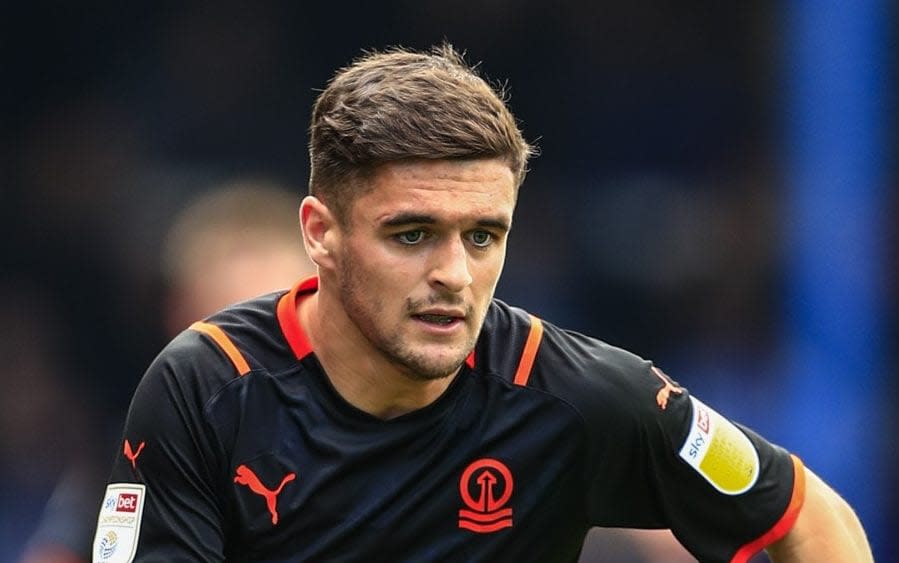Why there are still no openly gay footballers in the Premier League

British men’s football has never had an easy relationship with gay players. The fiasco over the OneLove armbands this week has been a reminder that when it comes to LGBT visibility, the sport has long prioritised talk over action. Nearly 25 years after Justin Fashanu took his own life, following years of homophobic abuse, British football still has not had another openly gay player in the top flight.
For months, seven European nations, including England and Wales, had said their captains would wear a rainbow armband during the World Cup in support of OneLove, an organisation that supports LGBT rights. The armband was never much of a gesture, but it would have been a small act of defiance at the tournament being awarded to Qatar, where homosexuality is punishable by imprisonment and in some cases, death. In the end, even that small protest proved too much. Following threats from Fifa that players wearing the armband could receive a yellow card, the FA told players not to wear them.
The U-turn was widely condemned. “Pathetic,” said Blackpool forward Jake Daniels, the only out gay player in the English league, on Instagram after hearing the news. He later deleted the post. The Australian player Josh Cavallo, who came out last October, said Fifa had “lost [his] respect”.
“If you’re going to virtue-signal, at least have the guts to stick to your supposed principles,” tweeted Piers Morgan.
The German team came closest any side has come to a protest, when they put their hands over their mouths before kick-off of their opening game. But still no rainbows.

“[Fifa’s] decision is really disheartening for LGBT people,” says Jon Holmes, a journalist and the chair of the LGBT sports writers group. “This felt like the one chance there might have been for a bit of visibility and solidarity at the tournament, and it has been sunk.”
Those hoping that the men’s game would keep pace with increased openness in other areas of public life have had a long wait. It was 32 years ago that Fashanu came out as the first openly gay professional footballer. In his memoir, Brian Clough, Fashanu’s manager at Nottingham Forest, recalls upbraiding the player for going to a “bloody poof’s club”.
Since Fashanu’s death, there have been countless initiatives to stamp out homophobia in the stands and support gay footballers. Yet LGBT players remain reluctant to come forward.

Former footballer Clarke Carlisle, a prominent spokesman for player welfare, said eight Premier League players had told him they were gay. Yet none in the Premier League are out, and Daniels is the only out gay player in the English league.
“Football is a socially conservative world,” says Ross Raisin, whose novel, A Natural, is about a gay footballer. “It’s not liberal, by its historical nature. It cherishes a certain kind of Punch and Judy individualism, but the people pulling the strings are invariably old white straight men. Football has a world view that desires order. It doesn’t like change.”
From primary school onwards, the sport has long been associated with stereotypical, red-blooded male heterosexuality. Sunday League and five-a-side leagues remain hotbeds of rooster-esque posturing, even among adults who ought to know better.
The professional leagues have never set much of an example. Consider the case of (heterosexual) Graeme Le Saux, who played for Chelsea and England in the 1990s and 2000s and was branded “gay” for admitting he read The Guardian. Fans taunted him with homophobic chants and Liverpool striker Robbie Fowler infamously waggled his backside at Le Saux during a match. Last month, Manchester United fans were investigated after “Chelsea rent boys” was chanted during a match. This week, Fifa is investigating the Ecuadorean fans over allegations of homophobic chanting.
The clubs and the FA have made efforts to improve the culture with initiatives such as Kick It Out, which campaigns against discrimination and Football v Homophobia, backed by the FA, which offers support to fans, grassroots teams and top-level clubs. Signs at stadia urge fans to report abusive chanting.
“Rainbow laces look cool, you see the rainbow flag at lots of grounds, but it’s not tackling anything more fundamental,” says Raisin. “Things generally are progressing very slowly, which is not hugely surprising.”
In recent years, footballers who have come out have been widely praised. “My team-mates have all been so supportive about it and everyone has had my back,” Daniels has said. “Their reaction has been brilliant.”

Zander Murray, a striker for Gala Fairydean Rovers who came out in September said it felt “like the weight of the world is now off my shoulders”. He now wants to help “other players who are struggling with this as it isn’t easy for men, especially footballers, to deal with”.
Yet there are still many countervailing pressures. Raisin points out that high-profile players coming out in football and other sports has not led to a rush. Even where men’s sport has had one or two high-profile gay players, as with Gareth Thomas in rugby union, they remain outliers.
“When Jake Daniels came out, there was this idea that it was all OK now, football has done its job, other players will naturally follow,” he says. “That’s not necessarily a healthy attitude. It’s not at the behest of the player to change it, it’s the responsibility of football as a structure to change things.
“One of the difficulties for a footballer is that life is so transient,” he says. “Jake Daniels might be able to make a safe space for himself at Blackpool, but a footballer moves clubs every two years. How do you know that the new manager is going to be as open? That the fans are going to accept you? That if you have a dip in form that’s not going to become an issue that comes up and that you are abused with.
“It’s very difficult for anything to change because I don’t think football is fundamentally interested, as a structure, for it to change. It’s interested in the window-dressing, but it’s the product that is the premium thing. Anything that threatens it is not trusted.”
Football has become one of Britain’s most valuable exports, with an international audience of billions, many of them in less tolerant countries than the UK. The league has no interest in upsetting the status quo, while individual players might worry that coming out could threaten sponsorship deals or other aspects of a career that, for all its potential riches, is very short.
The ongoing difficulties in men’s football stand in stark contrast to the women’s game. England’s Lionesses, along with winning a major trophy, are streets ahead of the men in terms of LGBT players.
“Inherently the culture of the women’s game has been very different,” says Jon Holmes. “The men’s game has had tradition and feelings of needing to conform and fit in and not go against the grain because you’re worried about your future and the career is so lucrative and so short. The women’s game has been devoid of those pressures, so it’s been able to be much more inclusive and allow LGBT people to flourish.”
Beth Fisher, a broadcaster and former Welsh hockey international says she doesn’t think women’s teams would have rolled over so easily on the armbands. It was notable that while the players eschewed the armband, former England women’s international Alex Scott wore one while covering England’s game against Iran for the BBC.
“I wasn’t a fan of the OneLove armband anyway,” says Fisher, “but it was a small gesture to our community that despite the issues in Qatar that they were with us, and they backed down at the first hurdle. We’re tired of that. We’ve had to fight so many battles of our own to open doors that are open to everyone else.”
Whatever the work the men’s game still has to do in the UK, psychologist and former NBA player John Amaechi says it is a mistake to conflate what is happening in Qatar with the domestic situation. “We are not blameless,” he says. “We are all culpable, but we can recognise that people chanting things at Brighton is not the same as what’s happening in Qatar.”
“Change is not impossible,” he adds. “Culture is not an immutable thing. But we have to show that there won’t be a deleterious effect on salaries, careers and opportunities.”

 Yahoo Sport
Yahoo Sport 





































